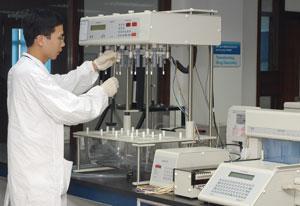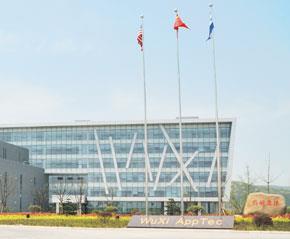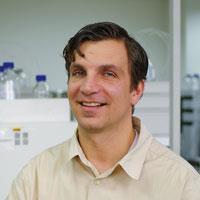Western companies are now outsourcing highly skilled science work to China. Can the industry's growing demands be met, asks Sarah Houlton
Western companies are now outsourcing highly skilled science work to China. Can the industry’s growing demands be met, asks Sarah Houlton
The growing trend for western companies to outsource operations to other countries, frequently in Asia, has primarily been driven by a need to cut costs. But recently a new outsourcing industry has sprung up, offering highly skilled chemistry services to the western pharmaceutical industry. In countries such as China the industry has grown rapidly to meet demand, providing employment for thousands of Chinese chemists.

The new Chinese companies were given a kick-start with government subsidies, often paying low or no taxes for the first few years, or given free buildings and other discounts. This allowed them to offer attractive rates and, as the density of companies increased, a thriving R&D environment followed.
Oceans apart
The industry doesn’t simply offer cost savings. ’Some people are after cost savings, but it’s not true that cost is a driver in every case,’ explains Rick Connell, vice president and head of external research solutions at Pfizer. ’Some things are very labour intensive, for example synthetic chemistry, and it’s cheaper to do that in China and India than it is in the US or Europe,’ he admits.
There is a huge pool of chemists for the Chinese companies to draw on. The country produces an estimated 300 000 life science graduates a year, and now a large number of chemists who headed off to Europe or the US for a PhD or postdoc - often followed by work in western pharma companies - are returning home. This is partly for family reasons and partly because the new breed of companies provides an interesting and challenging career in chemistry.
The returnees (or si to to in Mandarin - ’swim back through the ocean’) have proved crucial to the growing capability of the Chinese contract research organisations (CROs), bringing with them the skills they learnt in the west.
Pfizer started outsourcing discovery chemistry work to China in 2003, initially for bulk-scale compounds where the synthesis had already been done once but needed repeating on a slightly larger scale. At that time, Connell says, quite a few companies were springing up in Asia, offering very low cost services, largely in this resynthesis area where there was relatively little risk of failure.
Outsourcing chemistry
The trend in outsourcing discovery chemistry operations is industry-wide: from pharma giants to small biotechs. US-based Millennium Pharmaceuticals, for example, has been outsourcing chemistry for about three years now, according to Paul Greenspan, director of medicinal chemistry. ’In large part, it’s driven by the rapid expansion of companies in Asia which provide a lower cost alternative for chemistry services - synthetic chemistry, primarily using routine chemistry, as a support mechanism for our internal chemists,’ he says.
’We’ve found it a pretty cost-effective way of synthesising the intermediates our chemists need for their own chemistry, reference compounds and competitors’ compounds. It eliminates the need for our chemists to do straightforward, repetitive work and allows them to focus on more challenging, time-sensitive exploratory work,’ he adds. Another important consideration is flexibility, when extra resources are needed on a purely short-term basis. ’It allows us to scale up and scale down as necessary. If you’re expanding an internal workforce, you have to think long-term.’
As time has gone on, the CROs’ capabilities have increased. ’Some of the vendors showed a bit more competence, and hired more western-trained individuals with experience in the research world, and over time companies started wondering whether they could outsource basic chemistry that had not yet been done to them, teaching them as they went along,’ says Connell. ’I think that’s where the business took off - there’s only so much building block and scale-up work you can do, but now they are also making brand new compounds.’ And they are increasingly offering screening services, such as drug metabolism and pharmacokinetic studies.

Pfizer signed its first contract for drug metabolism in China in 2007, and, as Connell explains, there is a good deal of logic in doing these studies there. ’If you’re making hundreds and thousands of compounds in China, it takes time to package them up, transport them to a Pfizer site and unpackage them before you can weigh them out and test them,’ he says. The chemists use the test results to help design the next compound. ’The thinking was if we could move some of the basic screens that are not unique to any one programme - drug metabolism and safety science - then it would give a quick read of whether the compounds are more or less stable or toxic, and really drive knowledge,’ says Connell.
Outsourcing this type of work requires much more trust, he adds. ’In chemistry, there are a lot more forensic tools - if a reaction fails you can go back one step and look at the starting materials, for example,’ he says. ’In biology, the result is a number, and it’s a bit harder to tell if the number is good or bad. We want to go a lot more slowly on the screening side to build confidence that we are getting quality data.’
WuXi
Shanghai-based WuXi Apptec is the largest CRO offering chemistry services in China. Founded in 2000, it built on work chairman and chief executive Ge Li had been doing in his previous job at Pharmacopeia in the US. He had been setting up a collaboration with scientists in China to make compound libraries, but Pharmacopeia had a change of strategy and dropped the project. Li decided to start a company of his own, using the government and investor contacts he’d already built, to offer larger scale and lower cost compound synthesis.
The company has grown from 12 people in rented lab space to more than 4000 employees across several sites - more than 2000 of whom are chemists - offering chemistry services from discovery to manufacturing scale-up, as well as other services such as pharmacokinetic and toxicology studies, formulation and medicinal chemistry. It has contracts with most of the big pharma names as well as numerous biotechs.
One of its core offerings is library chemistry, explains vice-president of synthetic chemistry Rujian Ma. It currently has more than 500 templates - cyclic drug-like cores such as spirocycles and bridged bicyclic molecules - and more than 1500 are under development by the 100 chemists in Ma’s group. Some are sold exclusively to single clients. ’We take a template, and add drug-like side-chains to make a library of compounds,’ he says. ’We hope to develop 1000 new drug-like templates, plus 20,000 fragments and 500,000 non-exclusive compounds every year.’

According to chief scientific officer Shuhui Chen, in some cases customers ask for specific compounds to be synthesised, but increasingly they are asking them to design and make compounds that have particular profiles or activities. ’In future we will have more intellectual involvement in compound design,’ he says. ’My personal dream is that we will consistently deliver maybe two dozen clinical candidates a year. This will be a big achievement.’
The idea is that if they can carry out all the links in the drug chain - chemistry, biology, drug metabolism and pharmacokinetic studies, toxicology, formulation and manufacturing - they should be able to deliver multiple projects consistently.
’We don’t generate projects ourselves, but we have the ability to take a customer’s project all the way to a clinical candidate,’ he says. And the next phenomenon, he believes, will be helping Chinese generic companies discover their own drugs. ’We already have one client like this. They are more or less virtual, contracting out the research to us. So we are not only helping western pharma companies succeed, we hope to help Chinese based companies be successful in drug discovery.’
Biotech model
Connell says that the biotech industry is beginning to see the value of doing research this way. Companies are becoming more virtual early on in the game. ’Venture capitalist funders are saying they don’t want to invest in buildings to start with, but to use a service provider,’ he says. If that works out, it will then invest in buildings. ’The CROs started out largely as chemistry providers, and now, as they’ve built in more screening capability, they’re offering integrated R&D services. In some cases, this is effectively a turn-key service, where they internalise the research and come up with a Phase I candidate drug or a validated target,’ explains Connell.
Even for companies that are geographically close, collaborations aren’t without their problems, and these issues can be exacerbated by time and cultural differences.
Developing a mutual trust is critical, Millennium’s Greenspan says. ’By and large, our interactions with Chinese companies have been good - they are well organised, well managed, the quality of the chemistry is good, and they tend to stick to timelines. The work goes better when it’s well defined and there’s not a lot of problem solving involved; that’s partly a function of the CRO quality, but mostly because it’s very hard to do collaborative problem solving across the ocean. We find if we’ve given them complex problems that require a lot of troubleshooting it gets more difficult.’
Bioduro
Bioduro was initially set up - just over four years ago - to provide research capability, largely to the biotech community, explains president and chief executive John Oyler. ’The idea was to offer not just chemistry but also biology and DMPK [drug metabolism and pharmacokinetic] services - building integrated research,’ he says.

He realised China was a good place to be because close to half the team in the previous company he’d run in Boston, US, were Chinese, and he was impressed with their skills. ’They were unbelievably talented, and talking to some of them they made it very clear they weren’t opposed to living in China - what they wanted to do was pursue their dream of doing interesting research in a secure environment,’ he says. Maybe one in six of the company’s employees have returned to China from Europe, the US, Japan or Korea.
About 450 of the company’s 675 employees are chemists, and Oyler says that gives them a pretty broad set of expertise across the subject, and while they provide chemistry services and can make libraries, he believes the true strength of the organisation is the combination of this with a full suite of DMPK services, and the link with its discovery biology expertise.
’We’re doing a lot of work in oncology, metabolic disease and inflammation, mostly around GPCRs [G-protein coupled receptors], kinases and enzymes,’ he says. ’What we’ve tried to do is provide all the research capabilities that are needed in a few therapeutic areas so we can undertake the entire wet work for a company if that’s what they require.’
When they were building the company, he thought most work would be with biotech start-ups who don’t have their own capabilities, but in reality, he says, because big pharma companies have spent a lot of time in China learning what’s possible, they’ve been more aggressive than the biotechs whose venture capitalist funders have not. ’They’re starting to go down that route now, but maybe 90 per cent of our work is with pharma companies at the moment, which is not what I anticipated at the beginning.’
Outsource limit
So will chemistry outsourcing to China increase? ’The potential certainly exists, but for us it does become a dollars and cents issue,’ says Greenspan. ’We are pretty committed to our internal capabilities, so any growth externally won’t come at the expense of that. It’s a matter of priorities. There’s been incredible growth in the CRO industry, competition is very fierce and business models are changing, so it becomes a continuous analysis on our part as to whether we get what we need out of it.’
Industry will not outsource more if it does not feel the qualified staff are there, adds Connell. And however many good chemistry graduates the Chinese universities produce, the numbers are not unlimited. Several western pharma companies, including GlaxoSmithKline and Roche, have now set up their own drug discovery centres in China, which is adding to the competition for talent.
There’s tremendous competition in Asia for manpower, says Greenspan. He is slightly concerned that companies may not be able to keep up with demand. ’Their models for enhancing revenues seem to come from continued aggressive growth, so whether they can accomplish that while maintaining the high quality is something we have to keep in mind.’
The industry has grown impressively in less than a decade, so much so that it is pulling highly trained scientists from the west. ’I hope we don’t lose sight of the value of commitment to science in the west. We run the risk of losing its value to society,’ warns Greenspan. ’At the moment I think the balance is good - it will be very interesting to see where it goes.’
Sarah Houlton is a freelance writer based in London, UK






No comments yet